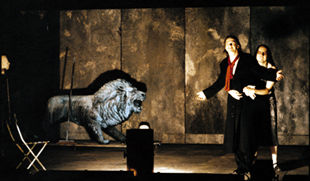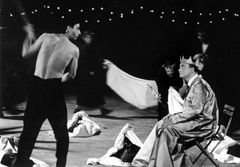AUTO | KOI | MAC | DOS | WIN | LAT

L'inconvenient des Boutures
|
| "The Face of Orpheus" |
 Written and directed by Olivier Py
Written and directed by Olivier PySets and costumes by Pierre-Andre Weitz Music by Jean-Yves Rivaud Choreography by Daniel Larrieu Cast (in order of speaking): Jean-Damien Barbin, Michel Fau, Redjep Mitrovitsa, Christine Fersen (from the Comedie Francaise), Irina Dalle, Samuel Churin, Benjamin Ritter, Philippe Girard, Elizabeth Mazev, Guillaume Rannou, Bruno Sermonne, Olivier Py, Daniel Znyk, Antoine Fayard, Sacha Barbin, Celine Cheenne Musicians: Christian Paccoud, Jean-Yves Rivaud, Pierre-Andre Weitz |

|
Olivier Py studied literature, then theology at the Catholic Institute, and, for a while, considered being a musician. However, he chose the theatre, graduated from Drama School, Rue Blanche in Paris, and then studied at the National Conservatory for Drama. In 1988, he created his company "L'inconvenient des Boutures". He is a playwright, he directs his own plays (frequently on a autobiographical basis), and often plays in them. Aged thirty-three, he has already written and directed more than 10 plays, and is considered to be one of the great hopes of the French theatre. True fame came after the 1995 Avignon Festival, when he presented his marathon-length play La Servante, the main theme of which was the 'service' of the art of theatre. After this acclaimed success, Bernard Faivre d'Arcier, Director of the Festival, asked the young author and director to produce a new work that could be performed in the Main Courtyard of the Palais des Papes. This gave birth to The Face of Orpheus, in 1997. Although Olivier Py is strongly involved in drama, he has a passion for cabaret, the 'masquerade' genre, which allows light, funny mixtures of songs and parody. In 1996 he made a wonderful debut in this genre, and delighted the Avignon public with his musical performance of Miss Knife's Cabaret. From then on, "he regularly appeared dressed as Miss Knife, a Berliner singer, with a strong liking for bad taste." (Rene Solis - Liberation) |
 We will keep in mind only the most enchanting images of the legend of Orpheus. His lyre could cast spells on animals and trees, it was the spirit of joy and the song of the earth; one can see a copper lion shedding a tear, an olive tree with whispering branches.
We will keep in mind only the most enchanting images of the legend of Orpheus. His lyre could cast spells on animals and trees, it was the spirit of joy and the song of the earth; one can see a copper lion shedding a tear, an olive tree with whispering branches.Let us listen to that song saying that a prophecy is but an ear and a miracle a mere event, within the reach of any archer's arrow. We often remember Orpheus in the underworld, this borderline experience in which, according to later legends, he would have saved and lost again his beloved. Persephone's bushes glow with questions about the soul and death. Finally, let us imagine his head cut off from his body, wandering down the river, after the Menades have torn the cythar player to shreds. This tirelessly singing oracle head will reach us and bring the last and first message, this word of life, beyond any religion and perhaps beyond any power. A few centuries later, the Orphiques, sons of the sky, wandering under the stars and quoting the poet's words, opened the way to the idea of a single god, and maybe to the prayer of the being, nowadays disappeared. The Face of Orpheus claims that the keywords found back on their golden leaves could be the heritage of a new time. Their unequaled experience is the inspiration of a new relation to the world. Olivier Py |
|
Central Army Theatre 11, 12 April Suvorov Square, 2 |
Eugene Onegin | Festival Homepage | Medea
Write us: chekhov_fest@theatre.ru
